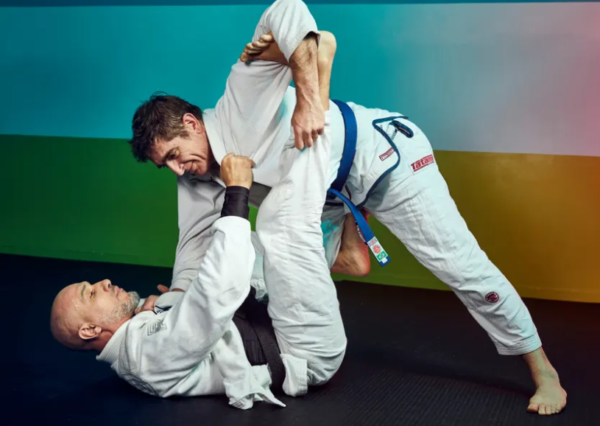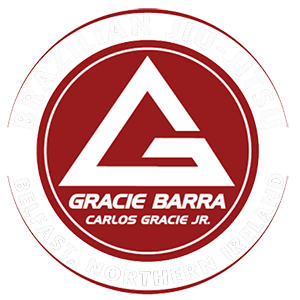
‘I sleep better, I feel incredible and my energy levels are through the roof’: the one exercise that finally worked
‘You’d have to be a psychopath not to find violent conflict intimidating. But it’s also fun’
Marcel Theroux on Brazilian jiu-jitsu – Article taken from the Guardian
I had wanted to try Brazilian jiu-jitsu for a while before I finally plucked up the courage to have a go. My first exposure to it was through taking my then eight-year-old son to a weekly class. Essentially, BJJ is a system of groundfighting – grappling techniques for controlling and submitting an opponent. It’s related to judo, but modern judo stops quite quickly when the competitors hit the ground. With BJJ, getting to the ground is just the beginning. Once they’re there, competitors use an extraordinary range of grips, joint-locks, arm-locks, leg-locks and chokes to submit the opponent.
I was drawn to it for a number of reasons. I loved how three-dimensional it was. There was something wonderfully free about the way the kids were encouraged to move: rolling, tumbling, wriggling around on the mats. It made me think how rigidly we carry ourselves as grownups. I was also fascinated by its credentials as a fighting system. I’ve always been interested in boxing and Chinese martial arts, and have taken part in both. There are things you can understand only by trying them.
There is no striking in BJJ, and it is drilled into practitioners that they have to stop immediately when an opponent taps their hand to signal a submission. This makes it possible to spar in quite a full-blooded way without getting injured. The BJJ term for sparring – rolling – emphasises this playful aspect. When the children in my son’s class sparred, it looked like kittens playing.
I watched him taking part for about a year before I finally took a deep breath and got on the mat myself, in 2018, just before my 50th birthday. I was quite fearful. I was in OK shape for a 49-year-old. I swam in the lido, did the odd boxercise class and kept up my tai chi practice for balance and flexibility, but you don’t see many people my age doing backward rolls, never mind trying to fight their way out of a rear naked choke.
My son’s instructors, Pedro Garcia and Benny SooTho, also ran adult classes for their club, GFTeam. I loved the movement: it reminded me a little of PE at primary school. I didn’t spar that day. I sat and watched, very intimidated, as everyone grappled. It looked extremely intense. Suddenly all that rolling movement is put in the service of getting into a dominant position, locking up your opponent’s limbs or neck until they signal their defeat with a couple of taps – or, if you don’t happen to have a spare hand, saying “tap”.
However controlled the sparring is, and however gentle and attentive your instructor is, there is no getting round the fact that, at its heart, practising BJJ involves violent conflict with another human being. You’d have to be a psychopath not to find that intimidating. But it’s also fascinating. How would you cope with someone sitting on your chest, trying to cut off your breathing? Or hyperextending your arm so that if you don’t tap your opponent’s hand, it will break? How long do you think you’d last? At what point do you give in?
I rolled at the following week’s class and it was like being hit by a soft train in pyjamas. I had no idea how to keep my opponents off me. I flailed around and got submitted almost immediately. For the first few weeks, I would sometimes sit out the sparring. But I would then regret not rolling. It felt like going to a restaurant and having only a starter. It turned out that the only thing worse than getting on the mat and being repeatedly submitted was not doing it.
Stepping into the gym, choosing to spar and competing in tournaments have expanded my idea of what I’m capable of
Four years later, I still find sparring intimidating and I sometimes feel a vague dread before class – particularly if I’ve missed a few and am rusty. But the reason I keep going is simple: after every single class – even, or perhaps especially, the ones where I’ve been smashed by everybody I’ve rolled with – I have a rush of endorphins. I feel extraordinarily calm, happy and stress-free. I’ve gained strength and flexibility, and lost weight. And I enjoy the companionship of the people who are choosing to undergo the same challenges. We are putting our wellbeing in each other’s hands and that gives rise to trust and mutual respect. It takes a lot of courage to walk across the threshold of a martial arts gym and participate.
I have no idea how long my body will keep up with this, but it has been a transformative experience. I’m in better physical shape than I have been for many years, but the more intriguing changes are mental. Those gradual increases in intensity, from stepping through the door of the gym, to choosing to spar, have expanded my idea of what I’m capable of. The process acquaints you with your courage.
This year, one of my teammates persuaded me to sign up for a competition. Not so long ago, that’s something I would never have contemplated. When I calculatedly missed the application deadline, my teammate Heath told me to send an email to the organisers. I couldn’t bring myself to say that I was too scared, so I did it and they slotted me in. I was bracketed with people broadly my age and weight, but it was still terrifying. As it turned out, I won both my fights.
Then I competed again in November, and lost my only match on points. That did sting, because I had improved, and yet I was still beaten. In the aftermath, I found myself reflecting on grips that I hadn’t dealt with, an opening that I hadn’t taken advantage of. It’s given me another challenge: how to improve my decision-making under pressure. Our senior instructor, Pedro, who’s a second-degree black belt, still competes, wins some, loses some, and seems at ease with whatever the outcome. That strikes me as very enlightened.
One of the other great joys of Brazilian jiu-jitsu is that I get to train with my now 14-year-old son. We are the oldest and the youngest members of the class, respectively. Of course, it’s a challenge to keep turning up there, to surrender to the process and not fixate on an outcome, to eat victories and defeats with equal relish, to get comfortable with discomfort and continually accept loss as a teacher, not a verdict. But it’s also – and this might sound odd – enormously fun.




